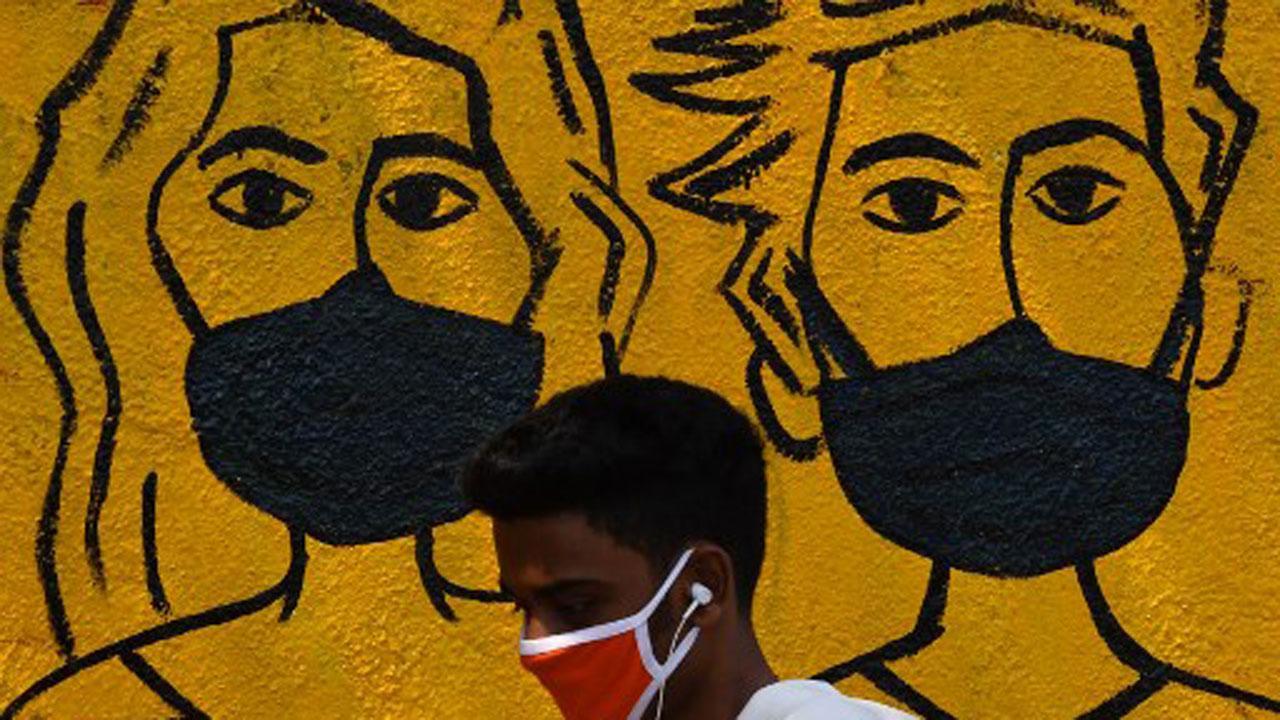Youth in our cities must be invested and help support groups and organisations during this pandemic instead of treating these months as just another break from school and college

A youth wearing a facemask walk past a mural depicting people wearing famcemaks, in Mumbai. Pic/AFP
It’s 5.30 pm. One of the tennis balls used in the cricket match has dispatched for the decisive six. There are shouts of jubilation by the winning team. Two more matches are being simultaneously played out in my housing complex. I could very well imagine being seated at one of the stands at the Wankhede. It is summertime, and school kids and collegians are living out what are typically some of the normal scenes that I have been seeing from my window for years now. But, 2020 wasn’t a normal one. And, by the looks of it, so will 2021 be.
ADVERTISEMENT
The guard had been dropped long ago. The rush to return to normalcy despite the curbs and warnings has fallen on deaf ears. But what’s equally worrying is the sense of obliviousness among young India over what’s being fought out of the medical frontlines of our country and the fallout from an economic standpoint. This was driven home in a harsh reality check when recently, I received a phone call from a collegian who I had taught at an NGO during his school days in Mumbai. He was back in his village now, since he had his summer break, and was using the time to help raise rations and funds for his fellow villagers who had lost their livelihoods due to the pandemic. “Didi, can you please help spread the word?” He quickly shared details of the NGO that he was helping out with. We chatted a bit; all the while I could sense the intent in his voice. It was refreshing to learn how this once shy, precocious boy who stuttered while speaking English had found his confidence and was now helping make a difference in his little small way.
Two different Indias!
A sobering moment followed, as I hung up on his call. Another towering six had just been hit. The joyous, almost fan-crazed shouts filled the air. I was forced to return to the insipid present scenario. We are living in two different Indias at so many levels.
On the one hand there are youth, like that conscientious collegian who chose to use his time off to participate in a useful cause. That the country was reeling from the after effects of this pandemic, and will continue to for a while, stirred him. “Sometimes, I stay up at night wondering what Sulabha maushi will do for a living,” he told me, while narrating about his neighbour whose husband was snatched away by COVID-19. It mattered that there were people around him who were affected. I was amazed at the awareness of this 18-year-old. Sadly, he is in a minority. Mind you, it’s not as if this boy hailed from a privileged family. He lived and studied in the city and experienced the tough life that comes with it. Yet, he thought about others.
An extraordinary year
As each cry of victory in one of these cricket matches pierced the evening sky, I was reminded of the colossal wastage of time and effort that these educated, middle-class, privileged youth continue to exhibit by whiling away these precious moments in leisure. Don’t get me wrong. I have nothing against the atypical ‘Netflix and chill’ 17-year-old’s priorities in their summer breaks. But it has been an extraordinary past year, and India, rather unfortunately, has been in the eye of the storm. It is this young India that actually has the power and the energy to drive and mobilise efforts. They are the ones who can make systems easier for the affected and lesser privileged, not just in their own cities but also in villages. Technology can do wonders when it reaches millions, but sadly, when I see these gully cricketers spend hours every day where their only goal is to win a close match, I wonder if the penny will ever drop. And these scenes that I witness are just a microcosm of it being played out in so many cities of India. Friends and colleagues have shared similar predicaments in their societies and neighbourhoods. “They seem unperturbed and in a tearing hurry to get on with their previous lifestyle. The pandemic was a blimp,” sighed one acquaintance. Their neighbours had thrown a big party for their son’s 18th birthday as they grieved the loss of a family friend in Delhi.
Life goes on for so many
Even in April, when cases in our city reached terrifying levels, life seemed to continue in so many homes and neighbourhoods, unaffected that the pandemic was in its second wave, and we were in a pressure cooker. Sure, nobody expects everyone to walk around in a depressive state, moping about a virus that refuses to leave us alone. Then why not create some sunshine instead? Spare an hour to do your little bit, like that collegian. How about dedicating a portion of your day to support an NGO, or offer to ferry supplies to an affected cluster of homes, help to teach a young kid who cannot navigate his/her classroom session on a hand phone? The options are all out there, right under their noses.
Now, if only young India was listening.
mid-day’s Features Editor Fiona Fernandez relishes the city’s sights, sounds, smells and stones...wherever the ink and the inclination takes her. She tweets @bombayana
Send your feedback to [email protected]
 Subscribe today by clicking the link and stay updated with the latest news!" Click here!
Subscribe today by clicking the link and stay updated with the latest news!" Click here!






